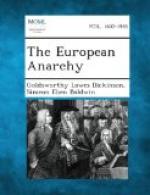A certain section of the Press, called here the Yellow Press, bears to a great extent the responsibility for the hostile feeling between the two nations.... It is plain enough that official England is quietly pursuing a policy opposed to Germany and aimed at her isolation, and that King Edward has not hesitated to use his personal influence in the service of this scheme. But it is certainly exceedingly dangerous to poison public opinion in the open manner adopted by these irresponsible journals.
Again, on July 28, 1911, in the midst of the Morocco crisis, Baron Guillaume, Belgian Ambassador at Paris, writes:—
I have great confidence in the pacific sentiments of the Emperor William, in spite of the too frequent exaggeration of some of his gestures. He will not allow himself to be drawn on farther than he chooses by the exuberant temperament and clumsy manners of his very intelligent Minister of Foreign Affairs (Kiderlen-Waechter). I feel, in general, less faith in the desire of Great Britain for peace. She would not be sorry to see the others eat one another up.... As I thought from the beginning, it is in London that the key to the situation lies. It is there only that it can become grave. The French will yield on all the points for the sake of peace. It is not the same with the English, who will not compromise on certain principles and certain claims.
[Footnote 1: The alliance between Germany and Austria, which dates from 1879, was formed to guarantee the two States against an attack by Russia. Its terms are:—
“1. If, contrary to what is to be expected and contrary to the sincere desire of the two high contracting parties, one of the two Empires should be attacked by Russia, the two high contracting parties are bound reciprocally to assist one another with the whole military force of their Empire, and further not to make peace except conjointly and by common consent.
“2. If one of the high contracting Powers should be attacked by another Power, the other high contracting party engages itself, by the present act, not only not to support the aggressor against its ally, but at least to observe a benevolent neutrality with regard to the other contracting party. If, however, in the case supposed the attacking Power should be supported by Russia, whether by active co-operation or by military measures which should menace the Power attacked, then the obligation of mutual assistance with all military forces, as stipulated in the preceding article, would immediately come into force, and the military operations of the high contracting parties would be in that case conducted jointly until the conclusion of peace.”
Italy acceded to the Alliance in 1882. The engagement is defensive. Each of the three parties is to come to the assistance of the others if attacked by a third party.
The treaty of Germany with Austria was supplemented in 1884 by a treaty with Russia, known as the “Reinsurance Treaty,” whereby Germany bound herself not to join Austria in an attack upon Russia. This treaty lapsed in the year 1890, and the lapse, it is presumed, prepared the way for the rapprochement between Russia and France.




